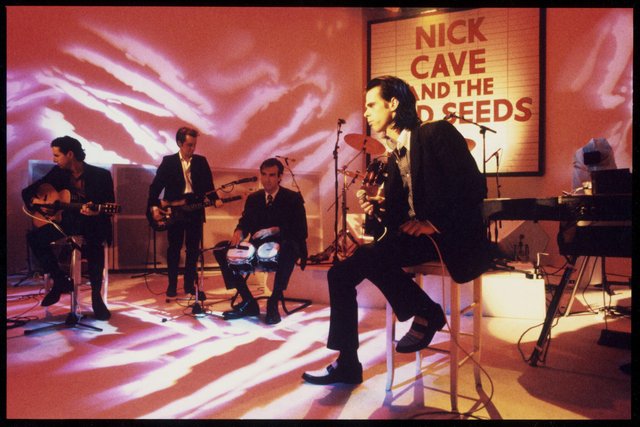Far From Any Road by The Handsome Family is the theme song for a brilliant HBO series, True Detective.
Another fantastic television series with a mood-setting theme is Peaky Blinders with Red Right Hand by Nick Cave and the Bad Seeds.
And who could forget Woke up This Morning, The Sopranos opening theme.

It seems, all the best television series (and films) have an incredible theme song. But why are they so mood-setting, enthralling and captivating, why is it that when the theme song plays, we’re already hooked? Vince Mancini from UPROXX writes:
“There was a period, thankfully brief, when it seemed like the opening credits sequence was becoming a dying art in television. It doesn’t help that you can just click “skip intro” during a Netflix binge and get straight to the money shot. But for every show with absent or irrelevant opening titles, there are an equal number of notably great contemporary opening title sequences — Succession, Game Of Thrones, The Americans. Most shows on HBO or FX have solid intros.”
And he’s absolutely right. The opening music is more important than we think. From a production perspective, the music “brands the show with a feeling.” From the grandiose orchestral strings on Game of Thrones and Westworld, to the slapping base from Seinfeld, before the show even starts, we identify the music as the spirit of the show.
Music that is ‘pleasurable’ releases dopamine in the brain, neurotransmitters fire on all cylinders and the same part of the brain is stimulated during other activities like eating good food, sex and drugs. Music can also become an addiction. Have you ever listened to the same song over and over…to get a fix? But not everyone experiences this. About 5% of the population ‘suffer’ from musical anhedonia which means they don’t experience chills or thrills when listening to music.
A study in 2012 showed that music is pleasurable when it both ‘fulfils and violates expectations.’ Unexpected and surprising events within the musical experience contributes to the intensity of the emotion and it has been found that, overall, we prefer music which is complex and less predictable (Gebauer & Kringelbach, 2012).
Music also carries an indication for intellect. As the dopamine system within the brain correlates largely with other regions of the brain, our appreciation for music is due to our ‘recently evolved’ and sophisticated neocortex. It has been determined that people who have a high emotional response to music tend to be stimulated due to more robust white matter in the brain which acts as signal pathways to the auditory cortex and other regions of the brain responsible for our emotional responsivity (Sachs et al., 2016).

‘Game of Thrones’ & ‘Westworld’ Composer Ramin Djawadi – Variety Artisans
It seems, after the first few episodes of a great series, the theme tune begins to take effect. After time, our brain develops an emotional association with music, especially when it is in the context of a television series with our emotional and psychological investment. Emotional mimicry occurs when we develop certain emotions which correspond with the tone and rhythm of the music itself. Listening to Le Cygne by Camille Saint-Saëns, for example, makes us melancholic with awe, as Immigrant Song by Led Zeppelin is a battle-cry for the Viking within us.
Certain music also affects our behaviour. A consumer behaviour experiment in 1999 (North et al.) showed that customers in a supermarket wine section would buy either French or German wine depending on the music played, which shows that we certainly act on our emotions and stimuli, consciously and subconsciously. We also develop an idea of ourselves when we listen to music, we all had a Killers phase, some of us even had a Bee Gees phase, perhaps; it isn’t a phase! In contrast, however, music also can give us courage, allow us to release endorphins and built-up stress. It can even lead us to make purchasing decisions or it can help us enter into a foreign land, as a mode of escapism before our favourite television series, whether it is F*R*I*E*N*D*S, or my personal favourite at the moment, True Detective.

Perhaps this is why all great shows have an addictive theme. Theme music gives us a sense of what to expect during a series. Dark lyrics and deep vocals (Red Right Hand) with a tolling bell gives us an ominous and mounting sense of climactic, violent gun fights in post-war Birmingham, while the ‘quasi-techno, hipster whisper’ song. Woke up This Morning, from the Alabama 3 (The Sopranos), with ‘Larry Love’ (Spragg) and ‘LOVEPIPE’ (Finnerty) on vocals and guitar, L.B Dope (Delafons) on drums, Wizard (Fleming) sequencing and producing sound effects with Harpo Strangelove (Reynolds) on harmonica and percussion have given us perhaps the most fitting and mysteriously cool theme song for perhaps the greatest gangster drama series ever made.


